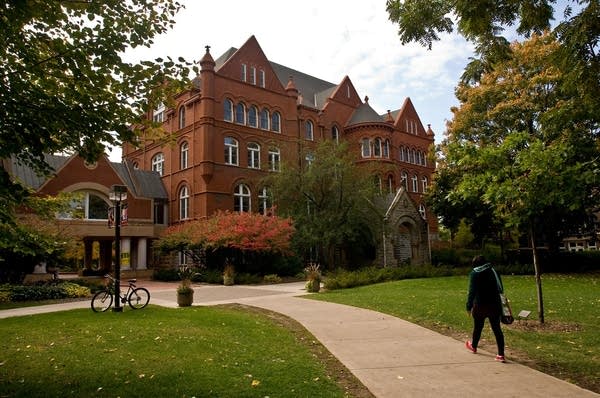As colleges respond to coronavirus, Macalester suspends in-person classes

Go Deeper.
Create an account or log in to save stories.
Like this?
Thanks for liking this story! We have added it to a list of your favorite stories.
Updated: 4:42 p.m., Monday
Around the state and around the country, a lot of colleges and universities are canceling in-person classes to try to slow the spread of coronavirus. They’re asking professors to teach online instead.
Macalester College in St. Paul, which had announced that the school would keep its classrooms open, is joining a group of Minnesota schools that are moving classes online.
Starting March 30, there will be no in-person classes for the rest of the semester, Macalester President Brian Rosenberg said in an email to its students, staff and faculty members on Monday. Most school buildings will be closed to students during the period, except for the Campus Center, the Health and Wellness Center, the upper level of the chapel and the upper level of Kagin.
“It was our most profound hope to maintain at least some semblance of normalcy on campus while protecting those in the community who are most at risk from serious illness,” Rosenberg said in his Monday statement. “It is clear now, given the most recent events, that we simply do not have the capacity to do this while keeping students in residence halls and classrooms and other public buildings.”
Turn Up Your Support
MPR News helps you turn down the noise and build shared understanding. Turn up your support for this public resource and keep trusted journalism accessible to all.
Until Monday afternoon when the president’s statement came out, Macalester didn’t require students to leave. Rosenberg said earlier that sending students home can have unintended consequences, and some students would be more burdened than others.
"In our case, for instance, we have a student body that is 15 percent international," he said. "And the majority of those students either won't be able to go home. Or if they go home, they won't be able to come back, or they may be going to places whose health-care systems are not nearly as good as the health-care system here. About 15 to 20 percent of our domestic students are Pell Grant recipients. A lot of those students will go to homes where there might not be WiFi to learn remotely — or again, where they might not have access to the kind of health care they have here."
Senior Dani Bowen-Gerstein went home for spring break, and she’s decided not to come back. She said when her younger brother’s college announced it was switching to online education, her parents encouraged her to do the same.
“They wanted the family to be together in like a time like this, and they felt safer and, like, just better about everything if both my brother and I stayed home," she said.
Bowen-Gerstein will be writing her senior capstone project — on the coronavirus and social media memes — from her home in Berkeley, Calif.
Macalester is extending spring break by a week to give faculty extra time to get ready for online teaching. Rosenberg said some subjects might transition easily, but teaching a painting or dance class or a chemistry lab will be a challenge.
"In some ways, whether we like it or not, we're running a real-time experiment in distance learning on a very large scale that we had never imagined," he said.
Rosenberg said the measures all colleges and universities are taking to mitigate the spread of coronavirus will be expensive. Many will have to refund millions of dollars in room and board — and few are well-positioned to absorb that without additional cuts.
And the spring timing of the pandemic means admissions events have been canceled, making it more difficult to recruit next year’s class.
You can hear more coverage of COVID-19’s effect on higher education on the APM Reports podcast Educate.


